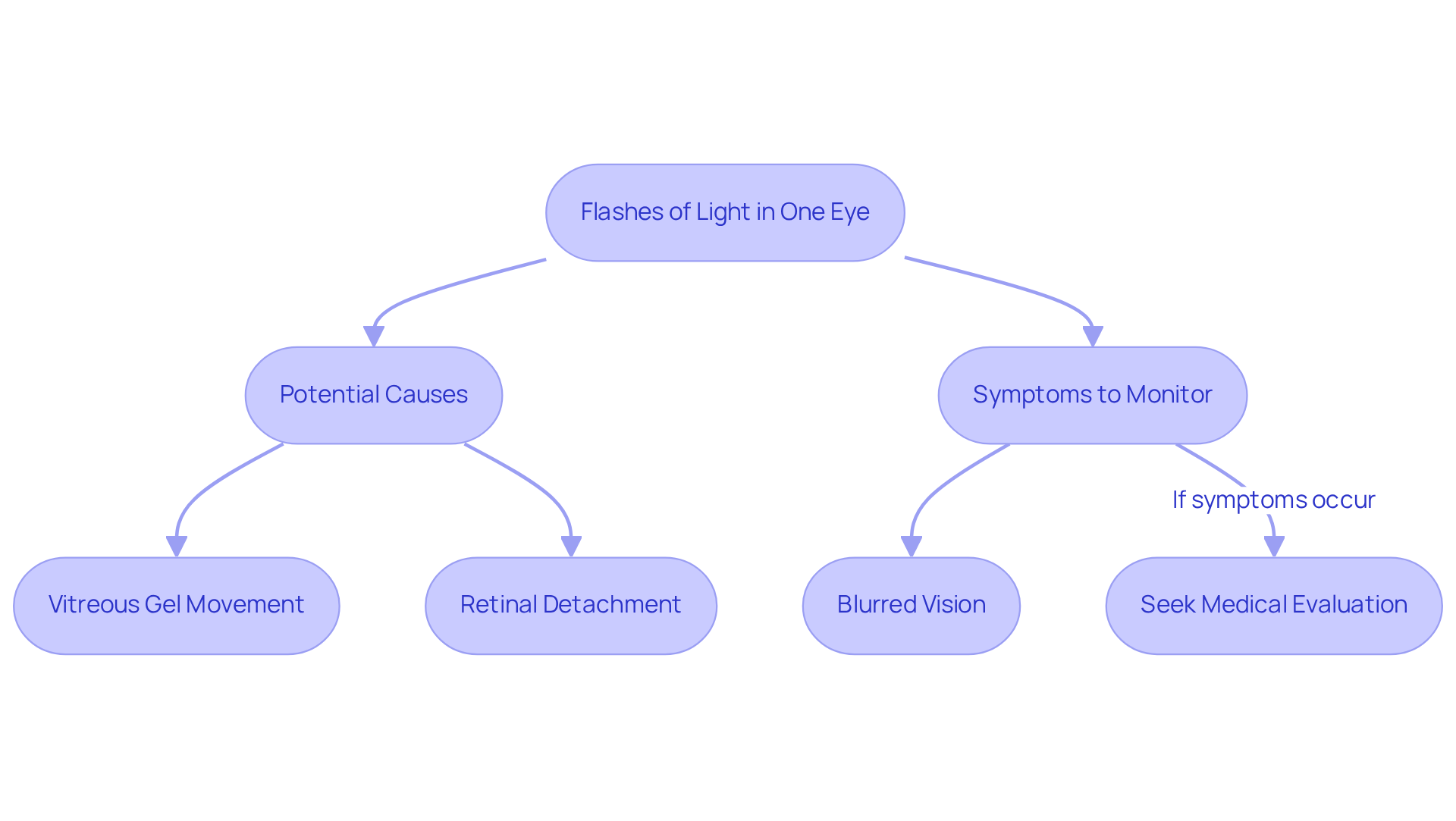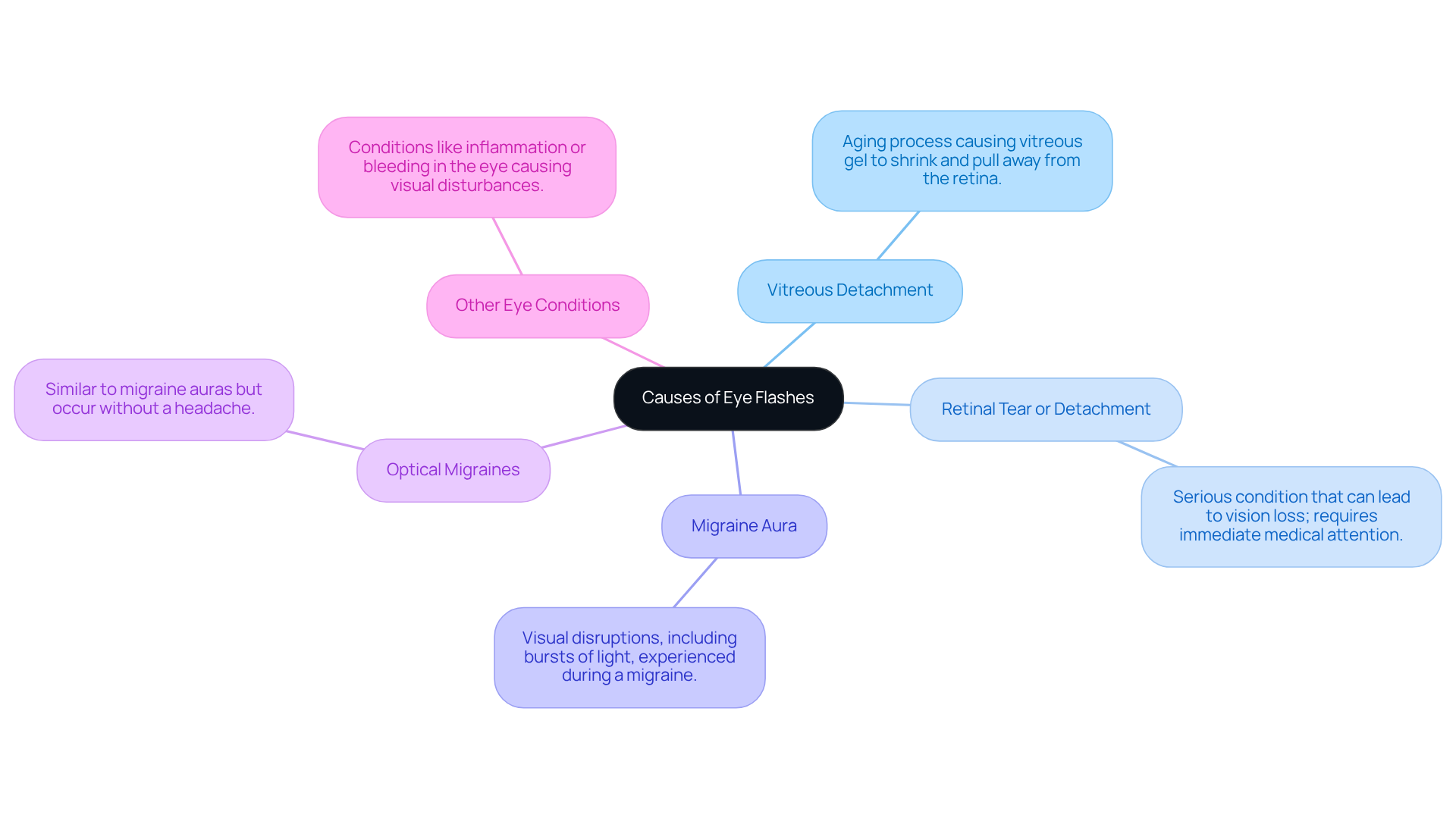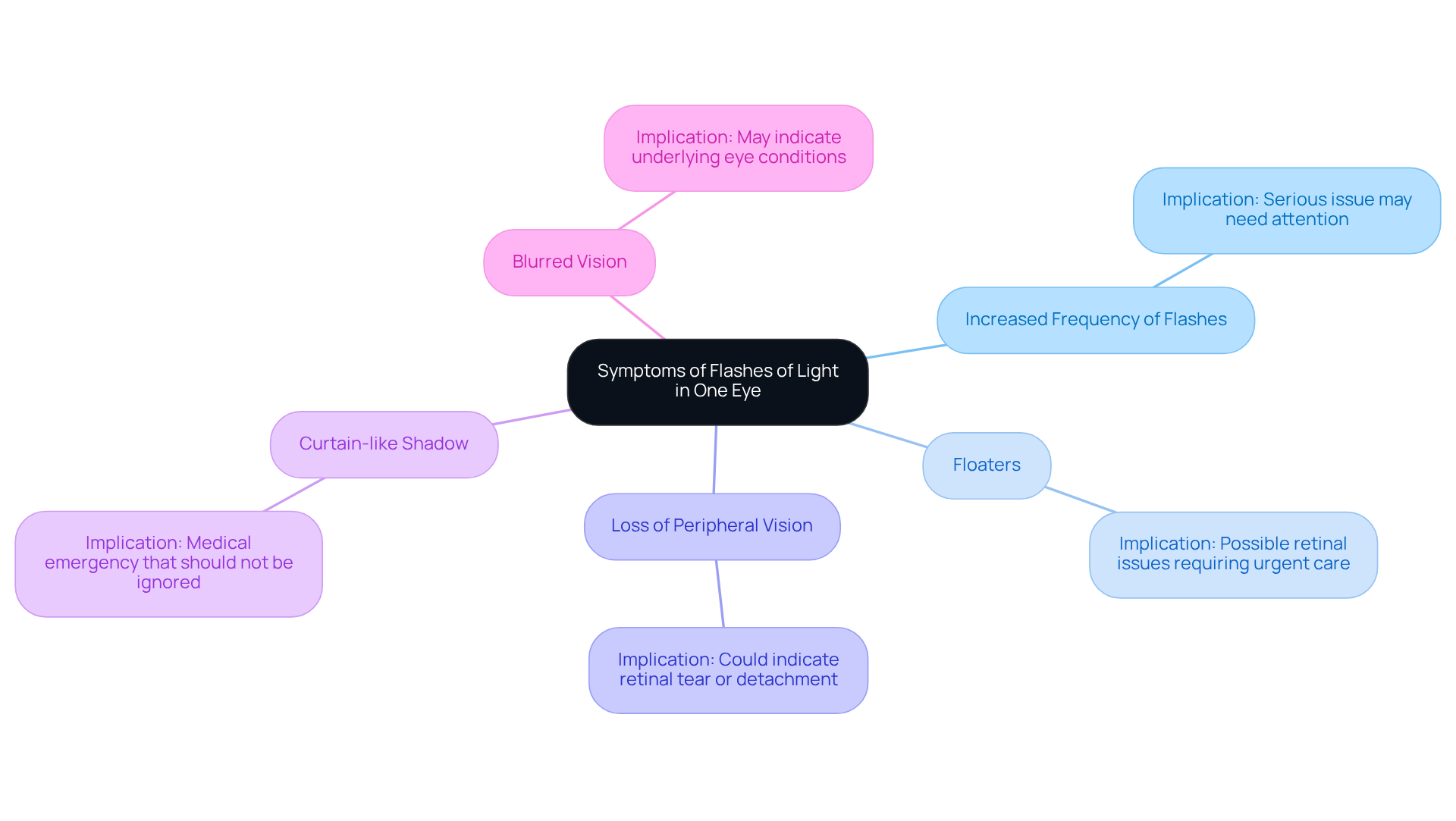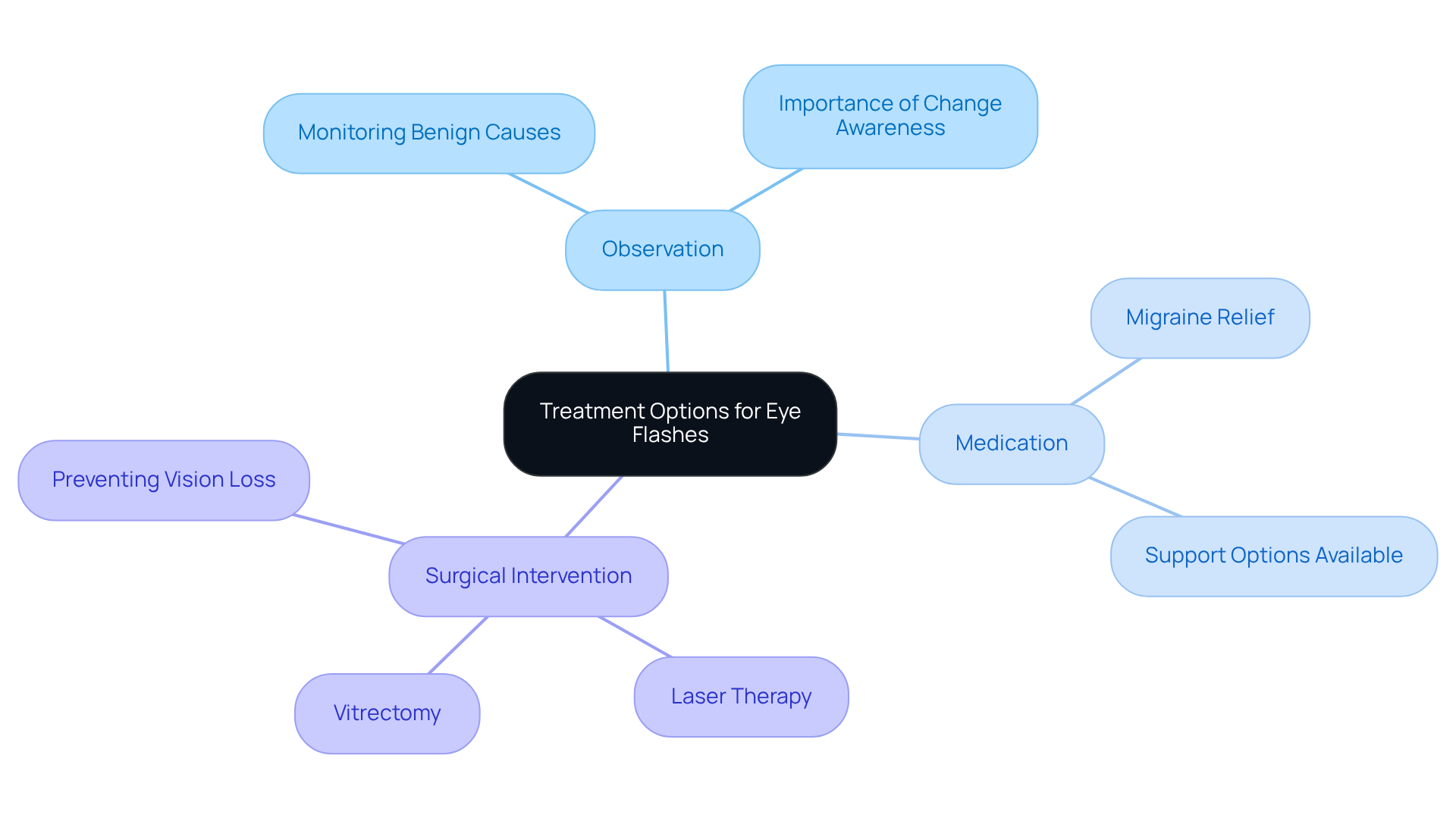Posted by: Northwest Eye in General on September 30, 2025
Overview
Flashes of light in one eye can be concerning, and it’s important to understand that they may arise from various factors, such as vitreous detachment, retinal tears, or migraines. We recognize that experiencing these symptoms can be unsettling, and they may indicate both benign and serious conditions.
It’s crucial to pay attention to any accompanying symptoms and seek medical attention promptly. Timely diagnosis and treatment can help prevent potential vision loss and address underlying issues effectively. Remember, you are not alone in this journey; we are here to help you through this process.
If you find yourself experiencing these flashes, we encourage you to reach out to a healthcare professional. Your vision and well-being are our top priorities, and taking action can lead to reassurance and peace of mind.
Introduction
Flashes of light in one eye can be a startling experience. Many describe these as brief bursts or streaks that disrupt vision. While it’s common to dismiss these occurrences as harmless, they may signal serious underlying conditions, such as retinal detachment or migraines.
We understand that this can be concerning, and it’s important to know that you are not alone in feeling this way. This article explores the various causes of these flashes, essential symptoms to monitor, and the treatments available. Our goal is to empower you to understand when to seek professional help.
What can these seemingly innocuous flashes reveal about your eye health? How can timely intervention prevent potential complications? We are here to help you through this process.
Define Flashes of Light in the Eye
Flashes of light in one eye, often described as brief bursts of light or lightning-like streaks, can be concerning. These occurrences happen when the retina is stimulated, which can occur due to various factors, such as the movement of the vitreous gel inside the eye tugging on the retina. While sporadic bursts, including flashes of light in one eye, can be harmless, it’s important to recognize that they may also signify underlying issues, such as retinal detachment or other serious conditions that require medical attention.
We understand that experiencing these flashes can be unsettling. That’s why it’s essential to know when to seek further evaluation from an eye care professional. At Northwest Eye, we encourage anyone experiencing flashes of light in one eye, particularly in conjunction with additional concerns like blurred vision, to arrange a consultation. Remember, this site is not a tool for self-diagnosis.
Early diagnosis and treatment are crucial. Untreated symptoms can lead to serious health complications, and we are here to help you through this process. Your well-being matters to us, and we want to ensure you receive the care you need.

Explore Causes of Eye Flashes
Flashes of light in one eye can arise from several causes, and understanding these causes can help ease your concerns. Here are some common reasons you might experience this phenomenon:
- Vitreous Detachment: As we age, it’s common for the vitreous gel in our eyes to shrink and pull away from the retina, which can lead to flashes of light.
- Retinal Tear or Detachment: This condition is more serious than vitreous detachment and can potentially lead to vision loss. It’s crucial to seek immediate medical attention if you suspect this.
- Migraine Aura: Many individuals experience visual disruptions, including bursts of light, as part of a migraine. If you’ve encountered this, know that you’re not alone.
- Optical Migraines: Similar to migraine auras, these occur without the accompanying headache, offering another explanation for those sudden flashes.
- Other Eye Conditions: Conditions such as inflammation or bleeding in the eye can also cause visual disturbances. Understanding these causes is vital for determining the urgency of seeking care.
We understand that experiencing flashes of light in one eye can be unsettling, but knowing the potential reasons can help you feel more at ease. If you have any concerns, please don’t hesitate to reach out for guidance. We are here to help you through this process.

Identify Symptoms and When to Seek Help
Symptoms associated with flashes of light in one eye can differ, and identifying them is essential for your well-being. We understand that experiencing these symptoms can be concerning, so let’s take a closer look at some key indicators to watch for:
- Increased Frequency of Flashes: If you notice that flashes are becoming more frequent or intense, it may indicate a serious issue that needs attention.
- Floaters: The appearance of new floaters together with flashes of light in one eye could indicate retinal issues, which may require urgent care.
- Loss of Peripheral Vision: This symptom could indicate a retinal tear or detachment, making it crucial to seek immediate assistance.
- Curtain-like Shadow: If you see a shadow or curtain effect in your vision, it is a medical emergency that should not be ignored.
- Blurred Vision: This can also occur with flashes of light in one eye and might indicate underlying eye conditions that necessitate professional assessment.
Comprehending these indicators is crucial, as they may be linked to severe eye conditions such as cataracts or retinal problems. If you encounter any of these signs, particularly alongside bright lights, we encourage you to seek prompt medical care from a Northwest Eye physician. Your vision is important, and we are here to help you through this process to avert possible vision loss.

Review Treatment Options for Eye Flashes
The treatment for flashes of light in one eye can vary depending on the underlying cause, and we understand how concerning this situation can be. Here are some common approaches:
-
Observation: If the flashes are due to benign causes, like vitreous detachment, simply monitoring the situation may be all that is needed. We know that waiting can be difficult, but it’s important to keep an eye on any changes.
-
Medication: For those experiencing migraines that lead to visual disturbances, certain medications can help alleviate discomfort. It’s common to feel overwhelmed, but there are options available to support you.
-
Surgical Intervention: In cases where there are retinal tears or detachments, surgical procedures such as laser therapy or vitrectomy might be necessary to prevent vision loss. This can sound daunting, but many patients find relief and reassurance through these procedures.
It is crucial to consult with an ophthalmologist if you notice flashes of light in one eye. They can help determine the best course of action tailored to your individual symptoms and conditions. Remember, we are here to help you through this process, and you don’t have to face it alone.

Conclusion
Experiencing flashes of light in one eye can be perplexing and worrisome. We understand that this phenomenon can evoke concern, and it’s essential to grasp its nature, including potential causes and the importance of seeking timely medical advice to maintain your eye health. While some occurrences may be benign, others could indicate serious conditions like retinal detachment. This highlights the significance of being vigilant and proactive in addressing these symptoms.
The article outlines several common causes of eye flashes, including:
- Vitreous detachment
- Retinal tears
- Migraine auras
It also emphasizes critical symptoms that warrant immediate attention, such as:
- Increased frequency of flashes
- Floaters
- Any loss of peripheral vision
Understanding these key points equips you with the knowledge to make informed decisions about your eye health and when to consult a professional.
Ultimately, awareness and timely action can make a significant difference in your eye health outcomes. If you experience flashes of light, please do not hesitate to seek medical evaluation. Early diagnosis and treatment can prevent potential complications and help preserve your vision. Prioritizing your eye health and understanding the implications of visual disturbances is vital for ensuring long-term well-being. We are here to help you through this process.
Frequently Asked Questions
What are flashes of light in the eye?
Flashes of light in the eye are brief bursts of light or lightning-like streaks that can occur when the retina is stimulated, often due to the movement of the vitreous gel inside the eye tugging on the retina.
Are flashes of light in the eye always serious?
Sporadic flashes of light can be harmless; however, they may also indicate underlying issues such as retinal detachment or other serious conditions that require medical attention.
When should I seek medical evaluation for flashes of light in the eye?
It is important to seek evaluation from an eye care professional if you experience flashes of light in one eye, especially if accompanied by additional concerns like blurred vision.
Why is early diagnosis and treatment important for flashes of light in the eye?
Early diagnosis and treatment are crucial because untreated symptoms can lead to serious health complications.
Can I self-diagnose the cause of flashes of light in my eye?
No, self-diagnosis is not recommended. It is essential to consult an eye care professional for a proper evaluation and diagnosis.






